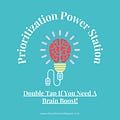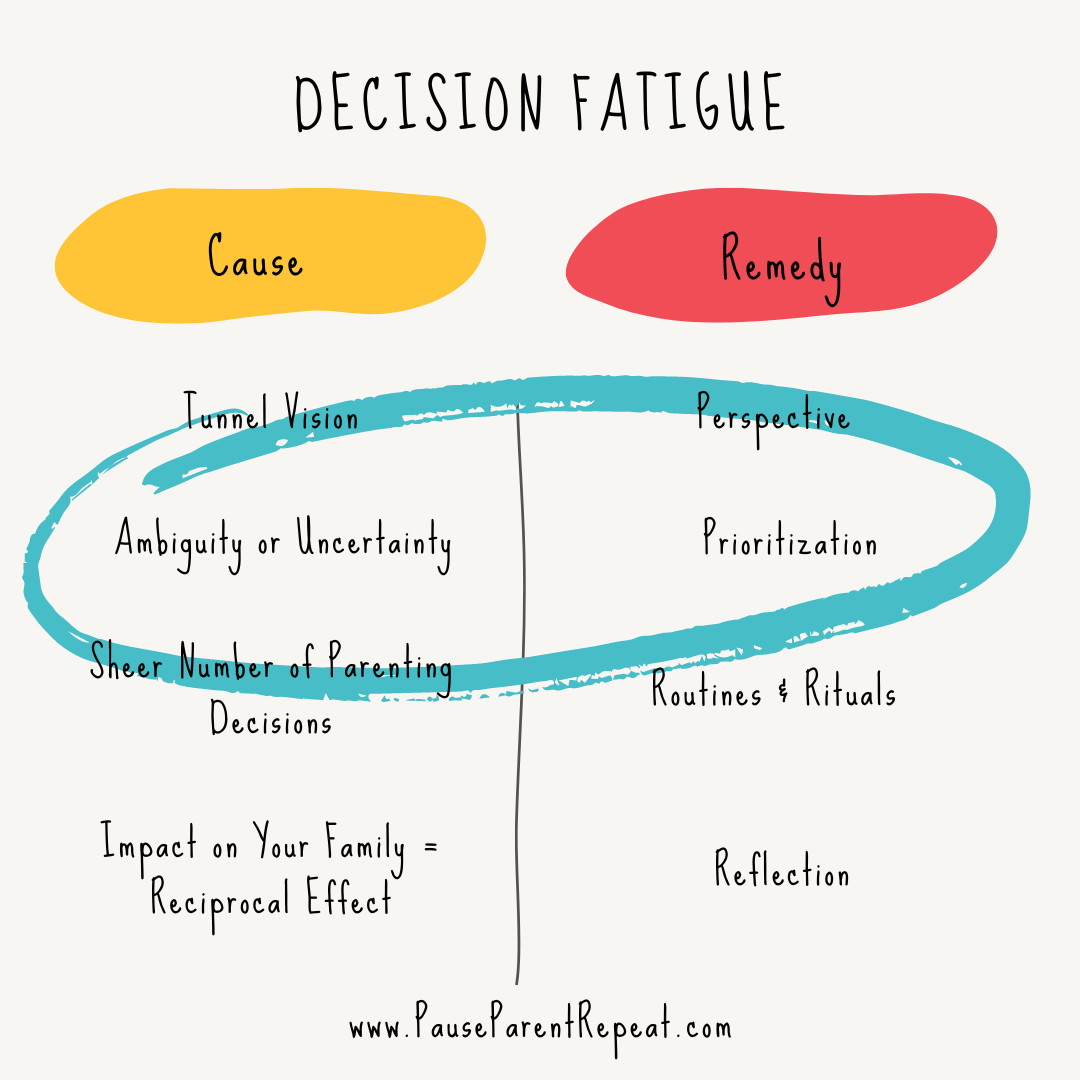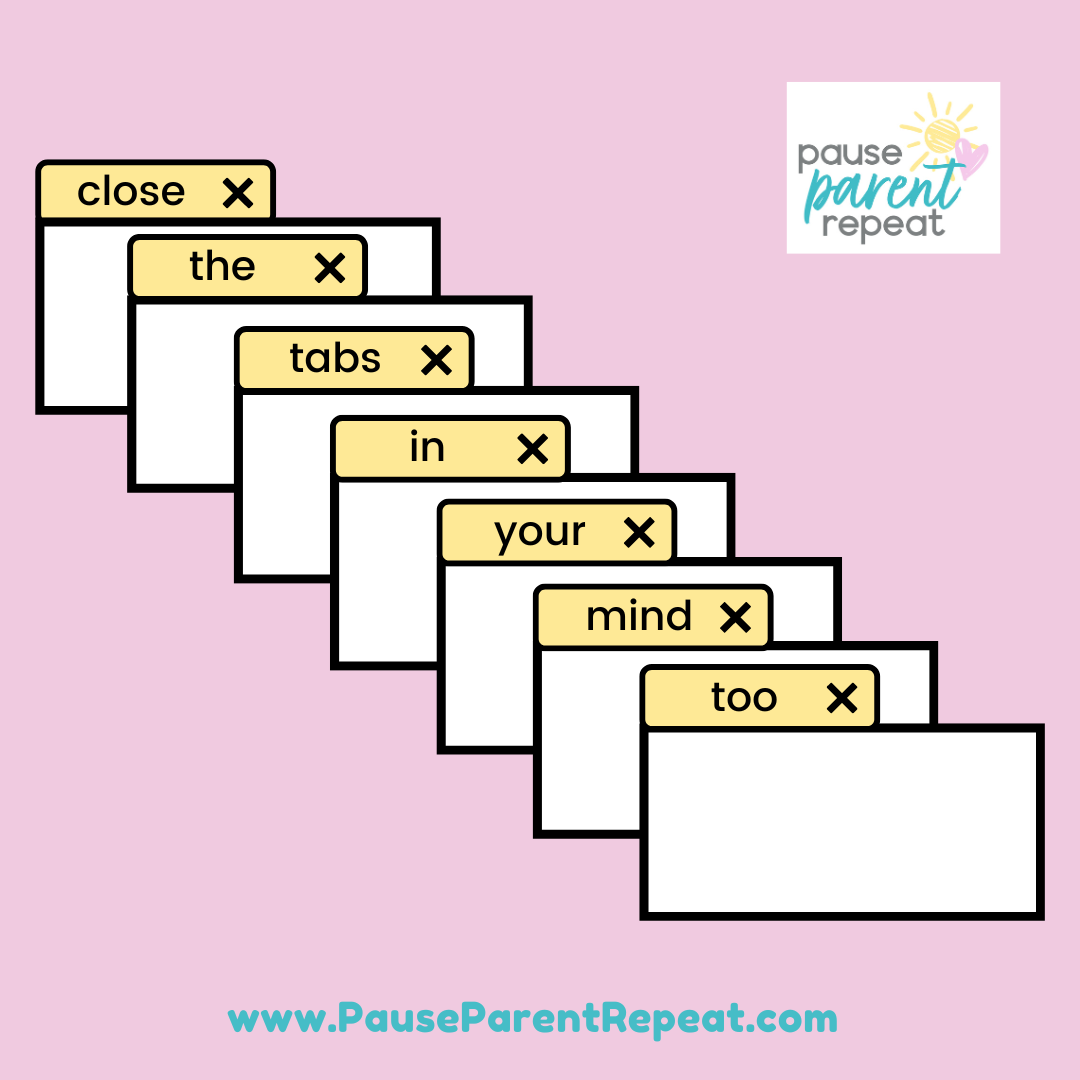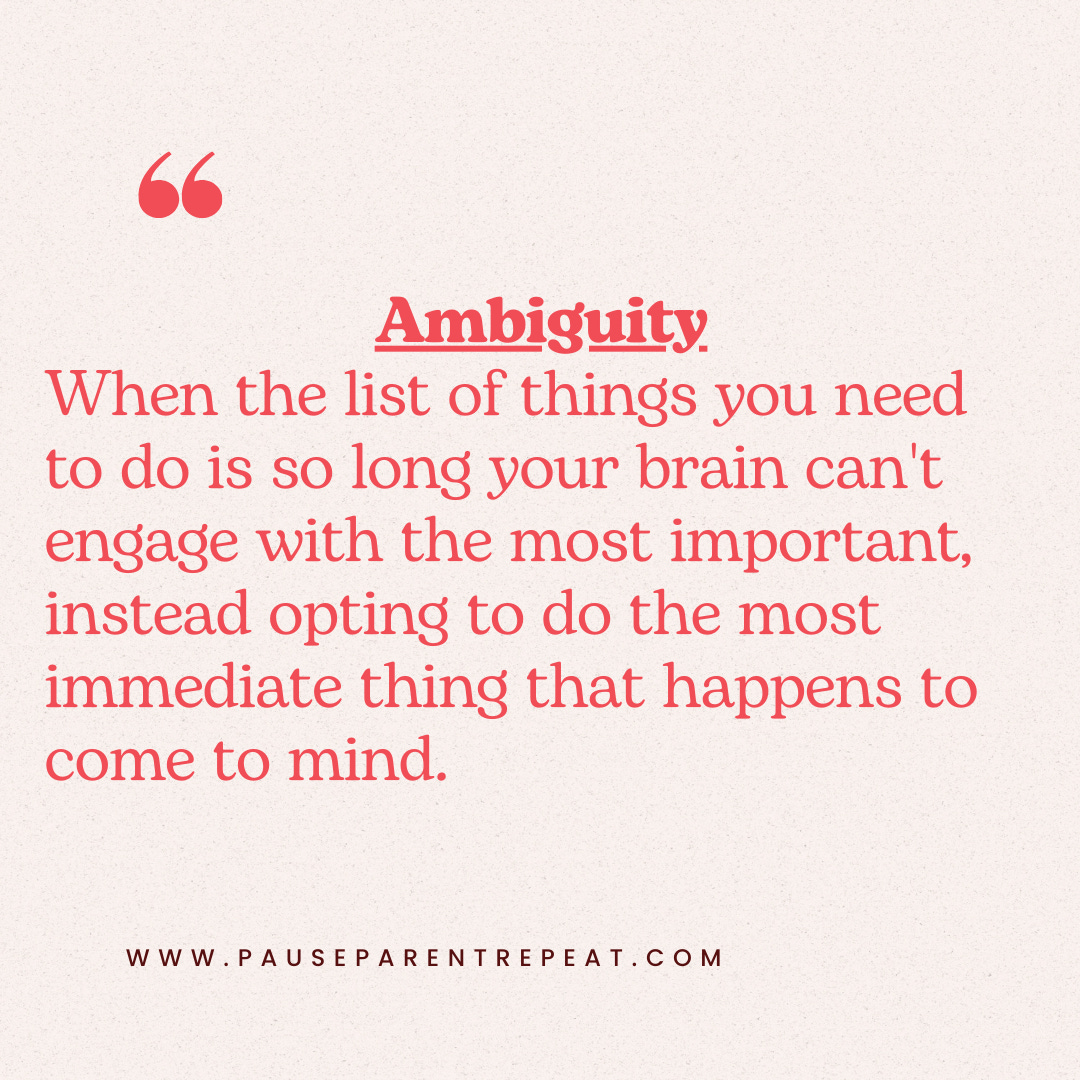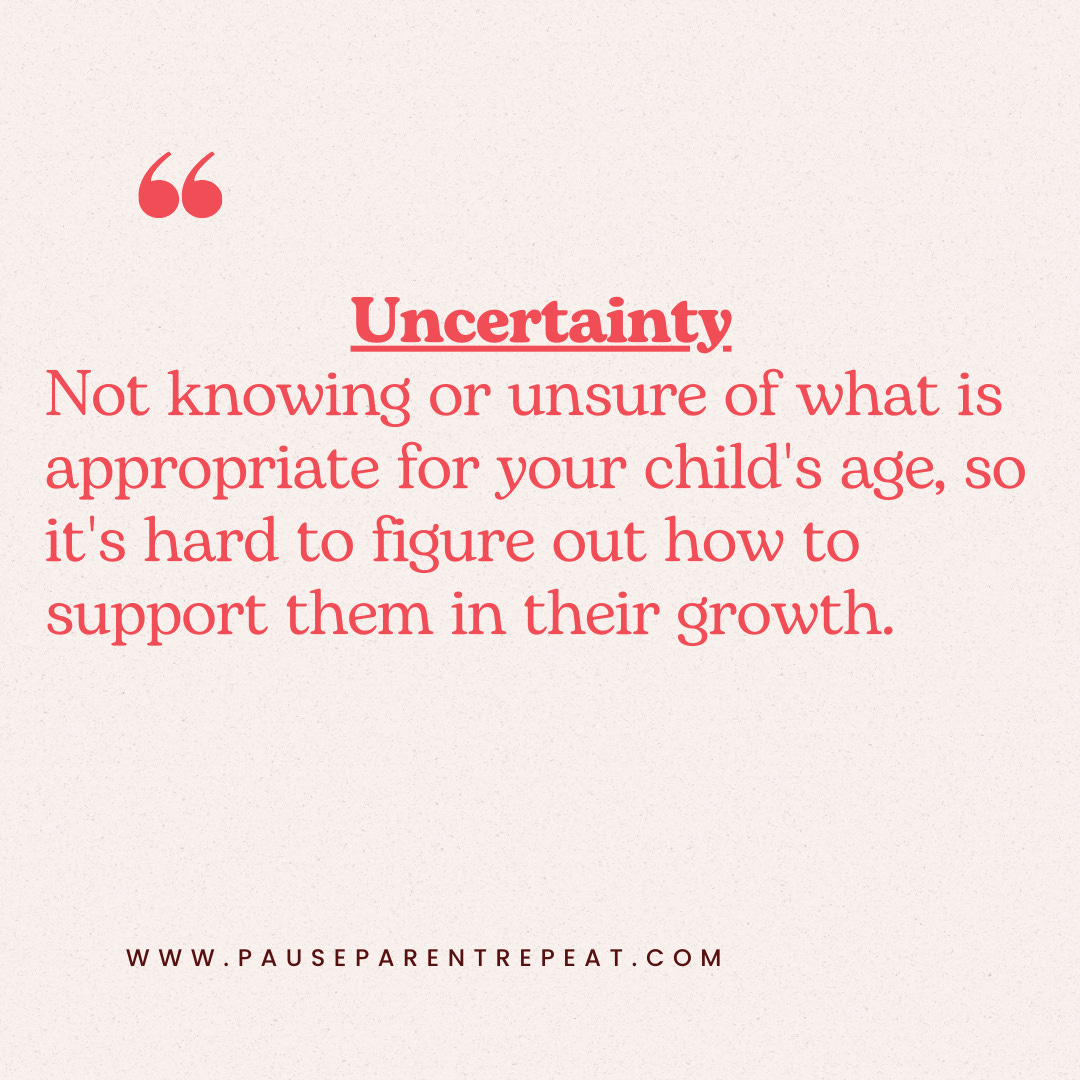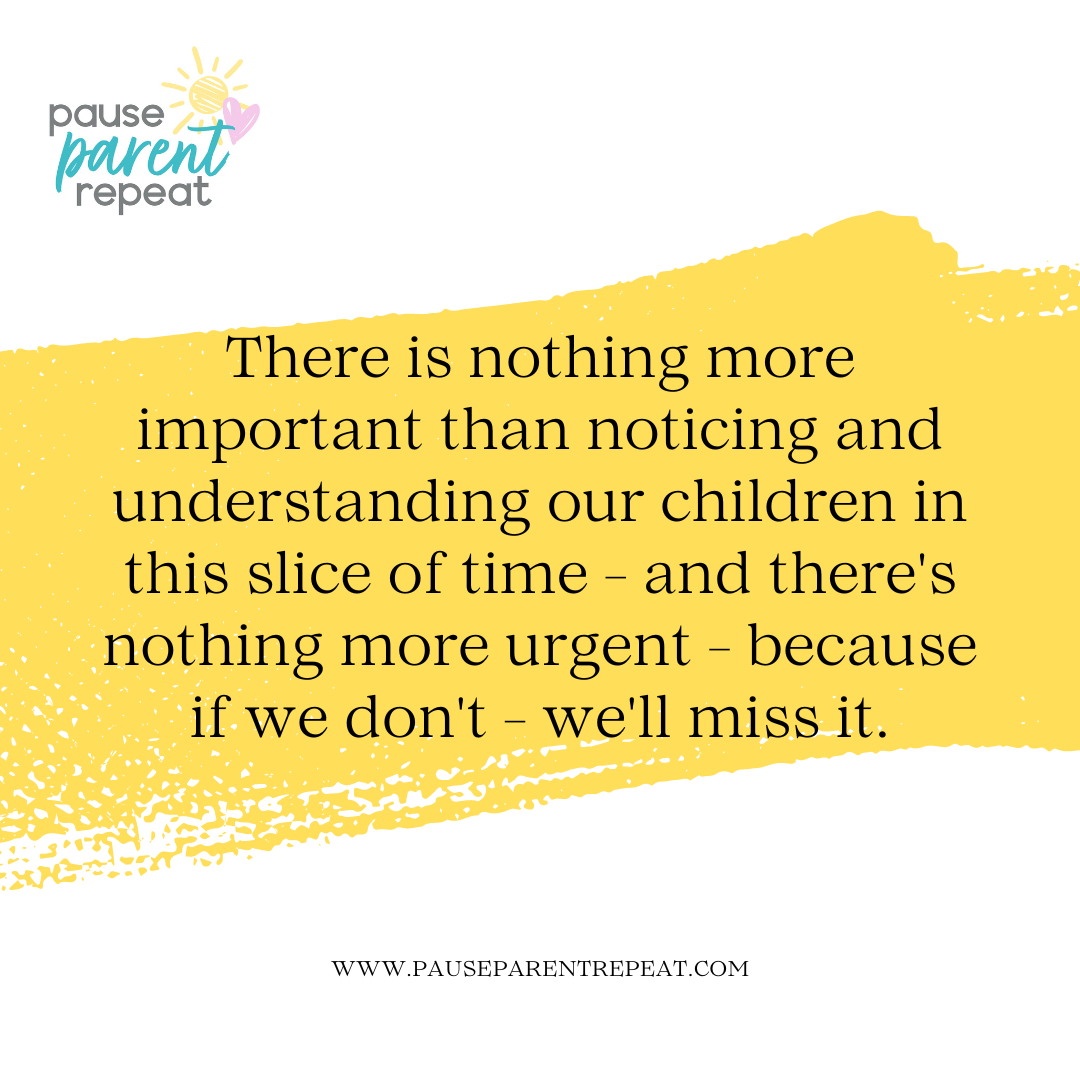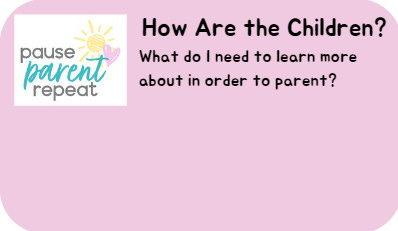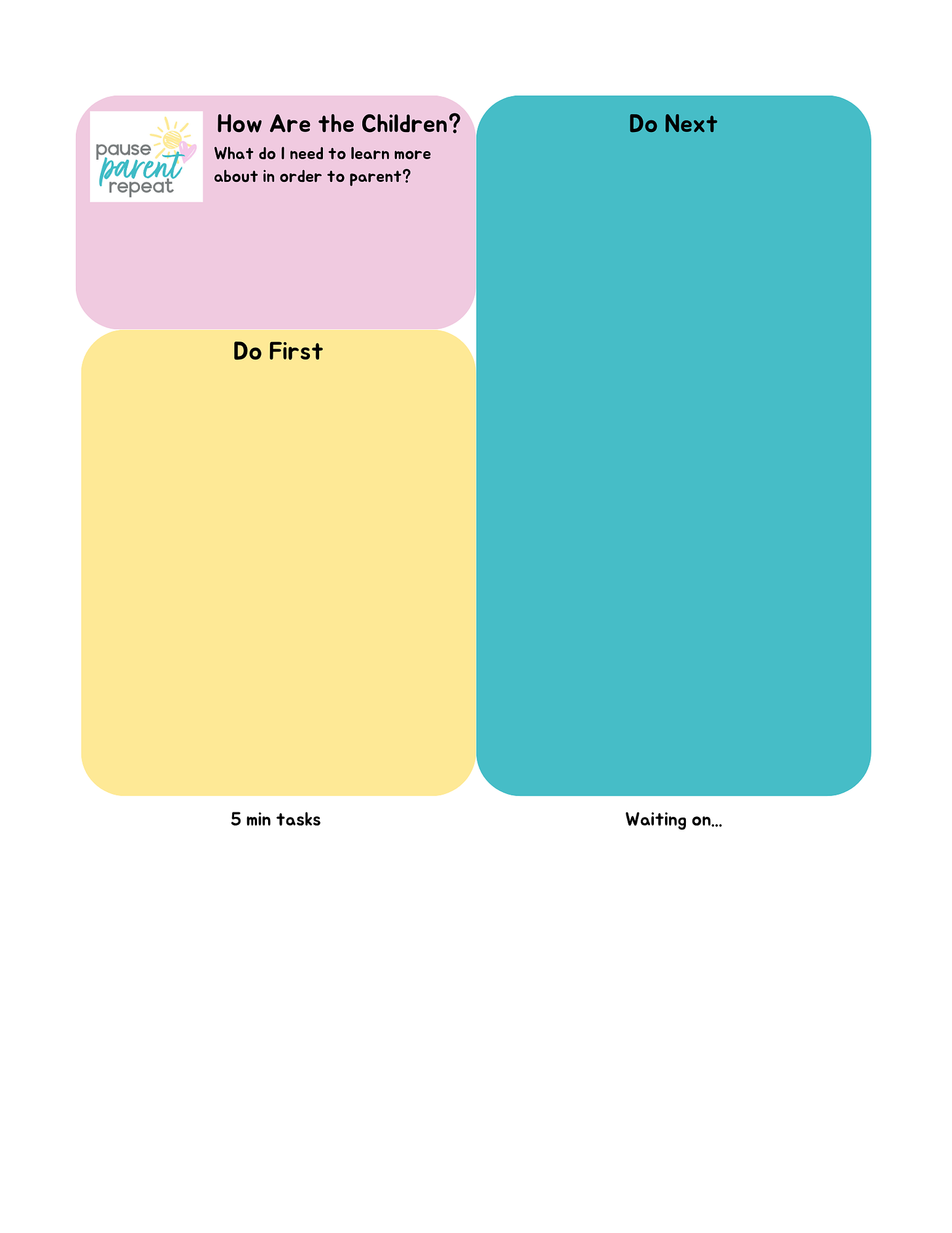The Prioritization Power Station
A remedy for Decision Fatigue caused by the ambiguity and uncertainty of what's most important or most urgent as a parent
Dear Friends,
Let's circle back around. In early January, while reflecting forward as I completed what I like to call "Look Backs", a working theory developed around the connection between decision fatigue and the time warp that seems to come with parenting (Read More Here).
With my heart set on somehow slowing this time warp down, my mind quickly got to work on finding antidotes to the Decision Fatigue I was very much experiencing. Armed first with the perspective gained from looking ahead 5 years, and second with some systems and routines to ease my day-to-day mental load, I'm feeling the capacity to shift back to prioritization, knowing that when I do pause and take the time to prioritize it's almost like my brain is supercharged!
Prioritizing as a parent is different.
The list is never ending - and if we just "keep going" the least impactful things begin to feel the most urgent or the most important - why? When I don't make the time to prioritize - I am not able to use the time I DO have productively which simply perpetuates the feelings of overwhelm.
With L.O.V.E.,
Sarah
Join the PPR Family - click here
Pause: Where do you put all of the "things" that crowd your brain?
As a parent I have more in my brain at any given moment than ever before. This is saying something. You never could have convinced my kindergarten teacher self that there would be more to do with 4 children in my care as a parent - than there was with twenty-something 5 and 6 year olds - yet it's true. Without a space to collect tasks, ideas and happenings my brain feels like a computer with too many open tabs for too long - eventually leading to slow processing and, at times, shutdown. I simply can't keep up.
Prioritization As A Parent
As a parent there are multiple levels of responsibility - the moment to moment (immediate responsibilities) and the seeds we are planting, but won't see until time passes (future facing responsibilities). This combination is especially complicated because our children are growing so much so fast that it's challenging to keep up.
As a society, we are quick to problem solve these types of challenges in the work setting. There are numerous tips, books and systems for us to learn from. Unfortunately there aren't many supportive resources with parents in mind. It's an odd paradox to parent in American culture where so much of parenting and child-rearing is pushed to the side instead of embraced. Without the space and time to grow into parenting, many of us are forced to carve it out for ourselves. So let's take a step in that direction and ask - What if we treat our parenting work as we do our occupational work?
Let's start with the unique challenges of prioritizing as a parent.
Ambiguity & Uncertainty: There is ambiguity that comes with the daily grind - "what to do next" type mental tasks combined with the uncertainty of what your child(ren) may need in this phase.
Parents need a system - a way to catch and a way to sort the never ending mental and physical lists so that distractions don't take over productivity and so that together, all in your household are able to build synergy. We also need tools to reach for when the unpredictable strikes so that we can more swiftly return to equilibrium.
While it's impossible to know everything - sometimes pausing just long enough is possible. When you build in a space to learn about just one small piece of child development, it can feel like you've been given glasses because, all of a sudden you can see much more clearly.
A Collection Bucket for Your Mind
Maybe you are familiar with the idea of a 'Junk Drawer' - that place in your home that you put the random things? Because I'm a big believer in the power of language - Let's replace 'Junk Drawer' with Collection Bucket.
What if we had one for the ever-growing list of the many things that cross our minds at the most random times? What if we had a way to collect these in one place that we could sort through and prioritize later - trusting that we won't lose them or forget them? I thought back to my time as an elementary principal - what did I do with the mental load that accompanied the growing needs of a growing school?
I had two lists - one on my phone and another on my "weekly worksheet" labeled - you guessed it - Collection Bucket. I jotted or typed anything that crossed my mind into these collection buckets, knowing they were saved for the time being. At the point of saturation (usually on Saturday mornings at Tamp & Tap) I would take the time to prune my tabs, so to speak, prioritizing what needed to be done by prioritizing the running lists I kept on my phone and clipboard. The relief was energizing - giving my brain a boost for not only that work session, but for the coming week as well.
Could it really be this simple?
With the central concept in place, I paused to tweak it to fit my current needs as a parent.
I need...
a method of collecting any and all tasks, ideas, happenings, events and reflections - ANYTHING that crosses my brain in moments I'm unable to pause long enough to even write it down
a way to sort what's actually important from what only 'feels important'
a way to sort what's actually urgent from what only 'feels urgent'
a quick look place for things that take 5 min or less, so when I find myself with some unexpected small chunk of time I can USE it!
a space for things I've begun, but am waiting on someone or something before I can continue or complete
a space to intentionally PAUSE before I parent in ways large and small by using a prompt to identify ONE most important thing to learn or relearn about child development this week
a protected time and space to communicate and process with my partner or myself
First Things First
Collection of All The Things
Make this as easy as possible on yourself.
For me- when I'm at home, I simply say "Alexa, add ________ to my Collection Bucket List." When I'm out and about, I quickly type or voice to text on my phone list "Collection Bucket". Gone are the days of paper pencil - I'd just lose it or wouldn't be near enough to capture my thought when I’d need to. If you have a system where you collect tasks and rememberings at work - perhaps just make a "home" version.
This is literally any and all things big and small. So far today, this has included:
adding Leif's tooth extraction to the family calendar
small finding Josh's missing slipper sock - don't ask
pajamas
exchange one kid coat
get Valentine’s Day box down
Funny how as a parent the actual small thing may actually lead to a big meltdown - so when I say I add ALL THE THINGS - I mean all the things - there's nothing too small or too big. One benefit of having a Collection Bucket is that you don't have to employ any mental effort on whether or not you actually need to do it or when, for that matter - you're just saving it - and your brain is released from holding onto it.
I would tell you how amazing it feels to have a place you can trust to catch all of the thoughts that need capturing, but I don't want to rob you of the experience yourself.
Pause. Take a moment to identify how you will collect all of your things.
Weekly Priorities 1 Pager
While simply unloading the many tasks works wonders, this feeling will only repeat itself if you have a system or consistent way to put your collection bucket to work. The bigger energy boost comes from using your collection bucket to prioritize.
So here it goes.
Pick a day of the week and make it sacred. Mike and I landed on Thursday nights immediately after the kiddos are all in bed.
How Are the Children?
You have your Collection Bucket and it's not going anywhere - so take a step back and begin by asking yourself (or your partner) "How are the children?" We begin with what's most important. Often in the hustle bustle, busyness of life we can be so focused on all the little things we overlook the big one; the reason we're likely doing all the little things to begin with.
By creating space to ask this question, we are able to take a breath and notice growth, challenges, changes and steadiness. These things fuel how we handle day to day life - clue us into knowing when we need to grow with our children and what we need to learn about in order to parent them during this particular fleeting phase. There is nothing more important than noticing and understanding our children in this slice of time - and there's nothing more urgent - because if we don't - we'll miss it.
This could be any number of things your children are showing you - resistance to bedtime, shifts in eating habits, sleep habits; it could include physical aggression to solve problems or what you perceive to be "sneaky" behavior, etc. At work, it is customary to learn about something we haven't dealt with before. As parents, we can do the same.
To help figure this out, you're really reflecting on what things have been going well, what has been challenging so that you have the opportunity to either continue or break a pattern in a way that's appropriate for your child's age. This matters so much. A child's brain does not process information like an adult brain the way a child's heart functions similarly to an adult heart - oooh no - the brain is becoming and developing- in each and every moment. (future link to more on this here).
Okay, so you've taken a breath and gotten to think (or talk) about your children and have identified any uncertainty that's likely been weighing you down. What is one - ONE - thing that you need to learn about so that you can support your child(ren) in a way that will strengthen your relationship, build their brain and your parent toolkit.
Sort it - First, Next, Never
Alright - now that the most important piece is in place, it's time to empty that collection bucket!
This is easy breezy, and the collective time it saves is tenfold. If you have a partner, I encourage you to do this together - you can share the same collection bucket or you can each bring your own with you. The reason is this - it's incredibly difficult to prioritize if you are not aware of tasks or happenings. This was not Mike's favorite thing initially. Instead of putting words in his mouth I asked him what changed or why he is now just as enthusiastic as I am to jump into our Thursday ritual. He said there were 3 benefits that make the investment of time worth it.
When I'm less stressed, he's less stressed - this is what motivated him most at first
Things do run smoother - as the weeks went on, we were getting more done, less things were sneaking up on us and we began enjoying more family time together
We either spend a little time proactively or a lot of time reactively to get the same goals accomplished - disagreements, and frustrations lessen and support and trust increase
Read each task, idea, happening, and reflection aloud. Then decide how important and urgent it is.
What needs to be done first?
What needs to be done next?
What can you let go of?
Some things you might decide to keep in your collection bucket - knowing they eventually need to be done, but not this week.
I like breaking things apart and putting 5 min tasks in their own spot - so that if I find myself with only a few free minutes I can easily see what I already decided to do (and I made that decision free from distraction haha). I also have a spot for things that have been started, but I’m waiting on someone or some thing before I can take the next action. This prevents things from falling through the cracks.
Capture this in whatever way works for you. Or feel free to use mine - especially if that means one less thing for you to do! (Weekly Priorities 1 Pager)


